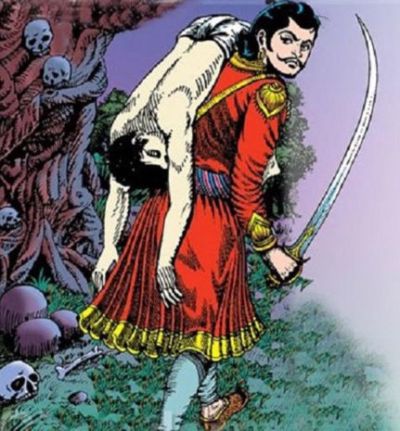“So tell me, o King, who was more noble, Jīmūtavāhana or Śaṅkhacūḍa? Who deserved more praise?
“Remember, if you know the answer, and don’t tell me the truth, your head will burst into a hundred pieces!“

इत्य् अस्माद् वेतालाच् छ्रुत्वा मौनं विहाय शापभयात् ।
तम् उवाच स त्रिविक्रमसेनो नृपतिर् निरुद्वेगः ॥ १२,२३.२०४ ॥
बहुजन्मसिद्धम् एतच् चित्रं जीमूतवाहनस्य कियत् ।
श्लाघ्यः स शङ्खचूडो मरणोत्तीर्णो ऽपि यो रिपवे ॥ १२,२३.२०५ ॥
अन्यप्रत्तात्मानं प्राप्य सुदूरं गताय तार्क्ष्याय ।
पश्चाद् धावन् गत्वा स्वं देहम् उपानयत् प्रसभम् ॥ १२,२३.२०६ ॥
एतन् निशम्यैव नृपस्य तस्य
वाक्यं स वेतालवरो जगाम ।
पुनः स्वधामैव तदंसपृष्ठान्
नृपो ऽपि तं सो ऽनुययौ तथैव ॥ १२,२३.२०७ ॥
King Vikram broke his silence, and replied…
“Jīmūtavāhana’s behavior and conduct was expected. After all, he had acquired a lot of good karma in his previous births, and those merits increased his virtues with every single birth he took.”
“But Śaṅkhacūḍa was an ordinary Nāga. He had escaped certain death, that too from the famed Garuḍa, whose mere name evoked fear in snakes.”
“Yet, when he returned and found that Garuḍa had taken someone else in his stead, he pursued him all the way to the mountains, and offered his body to his enemy.”
“Being ordinary, he yet went to extraordinary lengths to save an innocent life, and offer himself even though he faced death in return. He was truly praiseworthy!”
As the king uttered these words, the Vetāla flew off his shoulder, laughing. And King Vikram once more started to walk towards the banyan tree, determined to fetch him.
